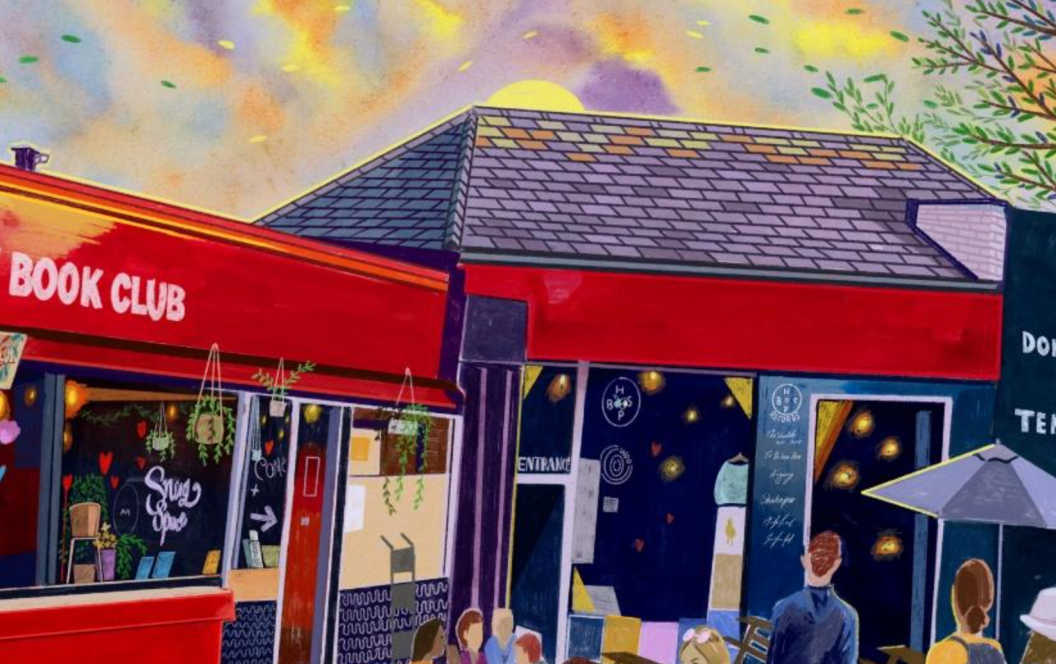This weekend in the heart of the North we see the largest art fair outside of London return: Manchester Art Fair. Last year they had 12,830 visitors, so hopefully you’ve got your tickets by now. (And if not, find them here↗↗↗)
For anyone who isn’t familiar with what an art fair entails, imagine an open space – it might be a village hall or the entirety of Regents Park (transformed by Frieze London each year into over 40,500 square metres of temporary exhibition facilities) – filled with pop-up walls and miniature galleries, where artists and gallerists can display their work for visitors and collectors. In addition to the fair itself, Manchester Art Fair has a full programme of talks, workshops and events, for collectors, curators, artists and stray, curious members of the public. Sounds right up our street!
Here at NDF we are constantly curious about anything that supports the arts ecology of the North, but what really sparked our interest this week is The Manchester Contemporary. Running alongside the art fair, it’s a smaller fair that takes a curated and ‘uniquely artist-focused approach’. They launched in 2009 and are held in Manchester City Gallery, with the aim of supporting younger galleries in meeting collectors and curators.

Artist-led spaces and emerging or working class artists are often lesser represented in conventional art fairs, which, tending to favour established artists, art dealers and collectors, can often appear disconnected or distant from these vital members of the art-world-ecosystem, resulting in something that can feel a little too much like an echo-chamber. The Guardian referred to one in particular as a ‘corporate snooze’, whose ‘Focus’ section for emerging artists was, until last year, tucked away at the back of the fair like an afterthought. ‘The aura of this art fair is based on the idea that […] money frees creativity.’
Interesting then, how the Manchester Contemporary, can be working towards the precise opposite whilst conforming to the same basic format. Despite the obvious size restraint – artwork is limited by the size of the pop-up walls and room itself – there is also some natural requirement of the art fair format to induce some degree of consumerism and support of corporation (with echoes of supermarket aisles). But of course, if an artist is to make a living from their work this is somewhat necessary: we must, to some degree, buy into the consumerist shape of an art-fair. But, Manchester Contemporary has shown us that with crystal clear intention to support spaces run by artists, who work with emerging artists coming from the ‘ground-level’, and with complete commitment to the anti-London-centric cultural scenes, it is possible.
Nat Pitt, curator of The Manchester Contemporary acknowledges this dichotomy and this distinction when he says that ‘in some ways the fair has always been about ‘keeping it real’. ‘Perhaps the Manchester or Northern attitude toward culture is about demystifying art through inclusivity and openness.’ What’s more, regardless of the corporate slant an art fair might take, they still offer a rare opportunity for every party surrounding an artwork – artist, curator, collector, audience – to meet, in person, and to talk. They give the space essential to serendipity, the space to wander into the unexpected or long-awaited encounter. The same format that hints at shopping centres or supermarket aisles, designed for buyers and collectors (and hey, maybe that’s you), for the same reason can provide an accessible and open atmosphere for anyone. You can take what you need, engage where you want to.
Amongst those exhibiting at the Manchester Contemporary this year are AWOL Studios, Flamm x Auction House (the collaboration between a new arts festival in Cornwall and a contemporary gallery in Redruth), Rogue Women, Venture Arts and Paradise Works. One of the art spaces involved, Abingdon Studios of Blackpool, is a contemporary studios and project space, dedicated to supporting ‘local, national and international creative ambition by the sea.’ (Gorgeous.)

Sitting ‘at the heart of an ongoing strategy for developing arts in the North’, the Manchester Contemporary offers a genuine counterweight to the London-centric scene that we are all used to. And surely, if we talk about developing arts in the North we are really talking about the circularity that this art fair is proposing. With an estimated 40% of sales going to northern galleries and artists, it puts into action the value that NDF will back to the end: the vital importance in promoting and supporting the ideas and the work of Northern creatives. That’s what we do, and that’s who we are.
Ultimately, the real encounters and interaction offered by art fairs, and by Manchester Contemporary in particular, is a marker of the need for these forms of live connection when our communications are so often digitised. Which has all of its own benefits, but certainly doesn’t replace real and serendipitous connection, whether that is person to person, or between person and artwork. Something or someone unexpected might speak to you. Our festival too is all about bringing together creative talent, both emerging and established. These kinds of events, with every accompanying workshop, talk, meeting or exhibition, can become their own microcosm; an energetic transfer of knowledge and ideas. They can offer spaces for absolute freedom and new learning, that, by their very nature, look resolutely forward.
So, take a look here and maybe see you there, or at the after party on Saturday 16th at Paradise Works, where they have open studios, exhibitions and DJs. Or perhaps take this as a calling card to check out the live creative events going on near you, and support your local art & design ecosystem. And of course, keep an eye out for our upcoming programme of festival exhibitions, talks and workshops!
Speak soon, Sally.
Sources Referenced:
https://www.manchesterartfair.co.uk/exhibit-manchester-art-fair-2025
https://www.neptunus.co.uk/case-studies/frieze-art-fair-frieze-masters
https://www.manchesterartfair.co.uk/about-the-manchester-contemporary
https://www.themanchestercontemporary.co.uk/fair-news/spotlighting-mechanics-making
https://www.themanchestercontemporary.co.uk/fair-news/spotlighting-mechanics-making
https://www.themanchestercontemporary.co.uk/fair-news/spotlighting-mechanics-making




